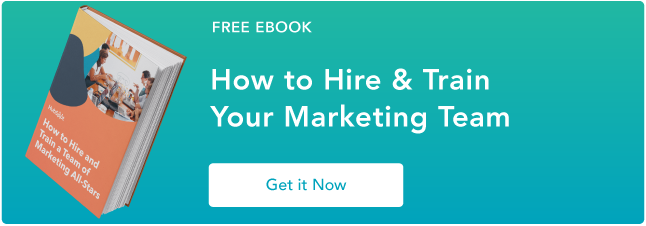Unless your company is on the Fortune 500 list with thousands of applicants clamoring for a position, the odds are that recruiting, training, and retaining talented team members can be challenging.

Similarly to how a person curates his Facebook profile to present only his best qualities, an applicant's résumé and interview only give you a hyper-curated snapshot of who he really is -- and we all know that when things get tough, people show their true colors. During the recruiting process, ask behavioral questions aimed at learning how well each candidate matches the following 19 qualities:
Their merits speak for themselves.
Talented employees don’t need to boast. They let the success of their work speak for itself, and they push themselves and their colleagues to do better. They recognize that this is the most impactful way to contribute to the growth and longevity of their companies.
They’re marathoners, not sprinters.
Rome wasn’t built in a day, and the best employees, no matter how talented, won’t change the world that quickly either. It’s imperative that they view their careers from the perspective of marathoners, not sprinters. They expect to deliver a consistent level of high performance. Many things can affect their ability to operate as a marathoner, including what motivates them. People who are driven by the intrinsic desire to succeed are often more successful than those who focus on extrinsic factors.
They’re resourceful self-starters and independent thinkers.
Great employees will help their employers improve. Even in a startup that has no processes, training, or skill-development resources in place, these employees learn at lightning speed and share what they learn. They strive to master processes and improve upon them when new learning applies.
They’re confident in their problem-solving abilities.
In many industries, there is a constant evolution of what works and what doesn’t. This means that new problems crop up daily that need creative, effective, and cost-efficient solutions. Great employees will bring a strong sense of logic, awareness, and confidence to their work -- analysis paralysis will leave them dead in the water.
They know what they don’t know and love to learn new things.
Much like a computer, our brains have a limited capacity to retain knowledge. Great employees know what they don’t know and learn what they need to. The most successful team members are constantly learning new ways to solve current problems and seeking out new problems that need to be solved.
They have a high capacity for creativity.
Many companies thrive by trying new things, so employee creativity is key. Knowing this excites the most productive employees but terrifies team members who aren’t a great fit for companies planning to grow and improve.
They seek a good challenge.
Many roles are predicated on the need to step up to goals and challenges that even the best of us may struggle at solving. The want and need for team members to seek challenges that drive the business forward is critical to a company’s current and future growth.
They buck the trends and invent effective solutions.
Successful businesses haven’t gotten to where they are today by adhering to the status quo. The best employees are those who know that if they can do something better, they can justify their approach and then do it.
They are modest about their accomplishments.
Every single team member has something to brag about. And being recognized for his or her accomplishments is satisfying to every employee. But the most successful people are typically more reserved because success is a way of existence, not a blip on their radars.
They underpromise and overdeliver.
Good employees know that a cardinal sin in business is saying they’re going to do something and then failing to do it. They know that a winning strategy for making a great impression is to promise 100% and deliver 115%. Going above and beyond comes back to reward these proactive employees in spades.
They focus on activities that maximize business impact.
There are 50 million things any one person can potentially do in a day. Successful employees can discern which ones to focus on based on the impact they will have on the business. They are organized, making task lists and culling priorities as more information becomes available.
They’re highly emotionally intelligent.
Any business is rife with change. Team members and clients come and go. Fires crop up and need immediate attention. Some days it can seem like the world is caving in, and other days feel like a cake walk. Successful team members know that remaining emotionally consistent throughout these days is imperative to keeping their productivity high.
They come to work engaged, committed, and ready to contribute.
Everyone has a life outside of work, which is necessary and encouraged. But successful workers know how to approach their work with full engagement. These employees arrive at work with their emotions and thoughts sorted, and if they can’t, they take time off to recharge.
They know how to learn and improve from failure.
We all fail, but successful employees know that failure can lead to success. Learning from failure helps them anticipate future failures and reach success more quickly. These employees know that “losing can help you win.”
They display strong leadership qualities.
No matter an employee’s role, he must possess leadership skills. Leadership can mean self-direction or the direction of dozens of people. Leadership means preemptively solving problems that are sure to arise. Leadership means actively looking out for the interests of the company before one’s own interests. Leadership means practicing sacrifice, patience, and follow-through on initiatives that don’t have immediate gratification.
They take ownership of their work.
All employees are producing work for the company. Successful employees know how to take credit for their wins but also how to take criticism well. Inevitably, mistakes will be made. But good workers own them, live them, and breathe them.
They know when to ask for help.
We all can’t be masters at everything, but great employees are masters at quickly acquiring the skills necessary to becoming successful in their roles. These workers know who to ask -- they find those who are great at knowledge hacking and learn the scaffolding for this approach.
They seek to listen and understand first, then to be understood.
Great employees have perfected the art of listening so their colleagues feel understood, and they’re masters at communicating well so their colleagues can understand them.
They strive for excellence, not perfection.
Let’s face it: Things will never be perfect and can always be improved upon. Perfectionism is a trap; perfection doesn’t exist. Successful employees know not to reach for perfection but to aim to be proud of their work and ensure that it exceeds the expectations of the end user.
It’s also key to note that the antithesis of each quality is a fatal personality flaw, which means if your candidate scores very poorly on one of the 19 qualities, he will likely become a liability to your organization in one way or another. That’s why it’s crucial to hire team members you’re confident will possess these characteristics and be proactive, efficient, and innovative employees.


![5 Creativity Challenges to Spark Your Next Idea [Infographic]](https://blog.hubspot.com/hubfs/00-Blog_Thinkstock_Images/creativity-challenges.png)




![The Daily Routines of Creative Professionals [Infographic]](https://assets.pinterest.com/images/pidgets/pinit_fg_en_rect_red_20.png)


![Sketch It Out: Why Doodling Is the Key to Staying Inspired [Infographic]](https://blog.hubspot.com/hubfs/00-Blog_Thinkstock_Images/Doodling_Infographic.jpeg)
